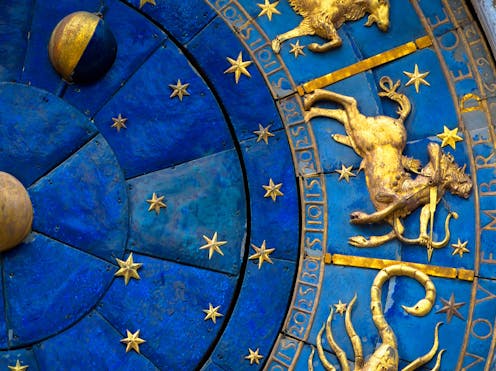Why is astronomy a science but astrology is not?
- Written by Talia Dan-Cohen, Associate Professor of Sociocultural Anthropology, Arts & Sciences at Washington University in St. Louis

Some people believe they find support for astrological predictions in their own personal experience. They read their horoscope and it seems just right: They did “meet someone interesting” or “benefit from listening to a close friend’s advice.” But the predictions are vague enough[16] that they would often be true even if astrology were utterly bogus. That’s why it can be difficult to figure out how to assess an astrologer’s predictions with precision.
Theories of astronomy, on the other hand, have evolved over the years with advances in technology. They are routinely corrected in response to increasingly precise measurements. For example, Einstein’s theory of general relativity[17] got a boost over Newton’s because it predicted the precise migration of Mercury’s closest point to the Sun year after year. If astrology had the same ability to make correct predictions with such precision, it might still be a major focus of scientific attention.
Why is astrology still popular?
But then why do so many people find astrology so useful if its predictions are not well founded? Why are astrological signs and horoscopes so popular?
It seems that looking to the sky to make some sense of what’s going on right now and what’s going to happen in the future has appealed to a lot of different people at different times in history all over the world.
When it comes to what’s commonly known as Western astrology, many people find their astrological sign to be a source of meaning[18] in their lives. In fact, nearly 30% of Americans[19] believe in astrology. It’s one of many tools we have for telling stories about ourselves to make sense of who we are, why we are that way and why experiences that otherwise would feel meaningless and confusing seem to happen to us all the time. In this sense, astrology’s success might be less about prediction and more about what it offers in terms of meaning and interpretation.
Among other things, astrology can be a useful prompt for self-reflection. It asks us whether we have traits typical of our astrological sign, and whether those we love have traits the theory suggests they ought to have. Thinking about our traits and relationships with the people around us is generally a good tool for understanding who we are, what we want to be and the meaning of our lives. Perhaps astrology is helpful in this way, independently of whether those traits are fixed by the stars.
Hello, curious kids! Do you have a question you’d like an expert to answer? Ask an adult to send your question to CuriousKidsUS@theconversation.com[21]. Please tell us your name, age and the city where you live.
And since curiosity has no age limit – adults, let us know what you’re wondering, too. We won’t be able to answer every question, but we will do our best.
References
- ^ Curious Kids (theconversation.com)
- ^ curiouskidsus@theconversation.com (theconversation.com)
- ^ astrology (www.britannica.com)
- ^ Astronomy (www.britannica.com)
- ^ philosopher (scholar.google.com)
- ^ anthropologist (anthropology.wustl.edu)
- ^ 17th or 18th century (www.jstor.org)
- ^ practiced side by side (en.unesco.org)
- ^ Galileo (doi.org)
- ^ Kepler (plato.stanford.edu)
- ^ no better (doi.org)
- ^ than guesswork (philpapers.org)
- ^ gravitational pull (www.physicsclassroom.com)
- ^ radio waves (radiojove.gsfc.nasa.gov)
- ^ Internet Archive Book Images/Flickr (flic.kr)
- ^ vague enough (scitechdaily.com)
- ^ theory of general relativity (dx.doi.org)
- ^ source of meaning (www.smithsonianmag.com)
- ^ nearly 30% of Americans (www.pewresearch.org)
- ^ Christianto Soning/EyeEm via Getty Images (www.gettyimages.com)
- ^ CuriousKidsUS@theconversation.com (theconversation.com)
Authors: Talia Dan-Cohen, Associate Professor of Sociocultural Anthropology, Arts & Sciences at Washington University in St. Louis
Read more https://theconversation.com/why-is-astronomy-a-science-but-astrology-is-not-192376

